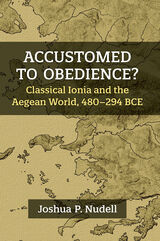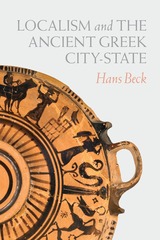3 books about City-states

Accustomed to Obedience?
Classical Ionia and the Aegean World, 480–294 BCE
Joshua P. Nudell
University of Michigan Press, 2023
Many histories of Ancient Greece center their stories on Athens, but what would that history look like if they didn’t? There is another way to tell this story, one that situates Greek history in terms of the relationships between smaller Greek cities and in contact with the wider Mediterranean. In this book, author Joshua P. Nudell offers a new history of the period from the Persian wars to wars that followed the death of Alexander the Great, from the perspective of Ionia. While recent scholarship has increasingly treated Greece through the lenses of regional, polis, and local interaction, there has not yet been a dedicated study of Classical Ionia. This book fills this clear gap in the literature while offering Ionia as a prism through which to better understand Classical Greece.
This book offers a clear and accessible narrative of the period between the Persian Wars and the wars of the early Hellenistic period, two nominal liberations of the region. The volume complements existing histories of Classical Greece. Close inspection reveals that the Ionians were active partners in the imperial endeavor, even as imperial competition constrained local decision-making and exacerbated local and regional tensions. At the same time, the book offers interventions on critical issues related to Ionia such as the Athenian conquest of Samos, rhetoric about the freedom of the Greeks, the relationship between Ionian temple construction and economic activity, the status of the Panionion, Ionian poleis and their relationship with local communities beyond the circle of the dodecapolis, and the importance of historical memory to our understanding of ancient Greece. The result is a picture of an Aegean world that is more complex and less beholden narratives that give primacy to the imperial actors at the expense of local developments.
This book offers a clear and accessible narrative of the period between the Persian Wars and the wars of the early Hellenistic period, two nominal liberations of the region. The volume complements existing histories of Classical Greece. Close inspection reveals that the Ionians were active partners in the imperial endeavor, even as imperial competition constrained local decision-making and exacerbated local and regional tensions. At the same time, the book offers interventions on critical issues related to Ionia such as the Athenian conquest of Samos, rhetoric about the freedom of the Greeks, the relationship between Ionian temple construction and economic activity, the status of the Panionion, Ionian poleis and their relationship with local communities beyond the circle of the dodecapolis, and the importance of historical memory to our understanding of ancient Greece. The result is a picture of an Aegean world that is more complex and less beholden narratives that give primacy to the imperial actors at the expense of local developments.
[more]

Localism and the Ancient Greek City-State
Hans Beck
University of Chicago Press, 2020
Much like our own time, the ancient Greek world was constantly expanding and becoming more connected to global networks. The landscape was shaped by an ecology of city-states, local formations that were stitched into the wider Mediterranean world. While the local is often seen as less significant than the global stage of politics, religion, and culture, localism, argues historian Hans Beck has had a pervasive influence on communal experience in a world of fast-paced change. Far from existing as outliers, citizens in these communities were deeply concerned with maintaining local identity, commercial freedom, distinct religious cults, and much more. Beyond these cultural identifiers, there lay a deeper concept of the local that guided polis societies in their contact with a rapidly expanding world.
Drawing on a staggering range of materials—including texts by both known and obscure writers, numismatics, pottery analysis, and archeological records—Beck develops fine-grained case studies that illustrate the significance of the local experience. Localism and the Ancient Greek City-State builds bridges across disciplines and ideas within the humanities and shows how looking back at the history of Greek localism is important not only in the archaeology of the ancient Mediterranean, but also in today’s conversations about globalism, networks, and migration.
Drawing on a staggering range of materials—including texts by both known and obscure writers, numismatics, pottery analysis, and archeological records—Beck develops fine-grained case studies that illustrate the significance of the local experience. Localism and the Ancient Greek City-State builds bridges across disciplines and ideas within the humanities and shows how looking back at the history of Greek localism is important not only in the archaeology of the ancient Mediterranean, but also in today’s conversations about globalism, networks, and migration.
[more]

Sovereign City
The City-State Ancient and Modern
Geoffrey Parker
Reaktion Books, 2004
The city has had a rich and tumultuous history, evolving from a powerful political entity in ancient times to its modern role as a local hub of tourism and commerce. Sovereign City examines the nature of the city's ever-changing status, as Geoffrey Parker investigates the city-state as a geopolitical form and explores its distinctive niche within different types of states. This probing work analyzes the various forms of city-states throughout world history, from the Greek polis, which Plato and Aristotle considered the perfect type of state, to the Roman imperial capital, to the political role of the city in early Islamic society. Parker also considers the revival of the European city-state in late medieval and Renaissance Italy and northern Europe, which culminated in the Hanseatic League, and how the rise of the nation-state contributed to the decline of the city-state.
Sovereign City is a wide-ranging and vigorous examination that seeks to understand the role of the city-state from the birth of Western civilization through its re-emergence at the dawn of the twenty-first century in the Far East and Islamic world.
Sovereign City is a wide-ranging and vigorous examination that seeks to understand the role of the city-state from the birth of Western civilization through its re-emergence at the dawn of the twenty-first century in the Far East and Islamic world.
[more]
READERS
Browse our collection.
PUBLISHERS
See BiblioVault's publisher services.
STUDENT SERVICES
Files for college accessibility offices.
UChicago Accessibility Resources
home | accessibility | search | about | contact us
BiblioVault ® 2001 - 2024
The University of Chicago Press









